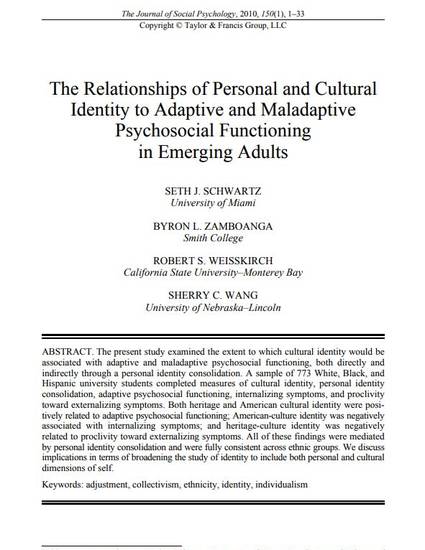
Article
The Relationships of Personal and Cultural Identity to Adaptive and Maladaptive Psychosocial Functioning in Emerging Adults
Journal of Social Psychology
(2010)
Abstract
The present study examined the extent to which cultural identity would be associated with adaptive and maladaptive psychosocial functioning, both directly and indirectly through a personal identity consolidation. A sample of 773 White, Black, and Hispanic university students completed measures of cultural identity, personal identity consolidation, adaptive psychosocial functioning, internalizing symptoms, and proclivity toward externalizing symptoms. Both heritage and American cultural identity were positively related to adaptive psychosocial functioning; American-culture identity was negatively associated with internalizing symptoms; and heritage-culture identity was negatively related to proclivity toward externalizing symptoms. All of these findings were mediated by personal identity consolidation and were fully consistent across ethnic groups. We discuss implications in terms of broadening the study of identity to include both personal and cultural dimensions of self.
Disciplines
Publication Date
January, 2010
DOI
10.1080/00224540903366784
Citation Information
Seth J. Schwartz, Byron L. Zamboanga, Robert S. Weisskirch and Sherry C. Wang. "The Relationships of Personal and Cultural Identity to Adaptive and Maladaptive Psychosocial Functioning in Emerging Adults" Journal of Social Psychology Vol. 150 Iss. 1 (2010) p. 1 - 33 Available at: http://works.bepress.com/rob-weisskirch/31/
